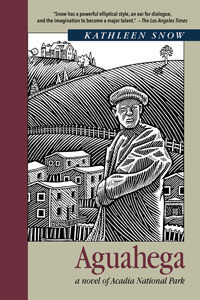Who owns Maine’s spectacular Aguahega Island — the National Park Service, the rich summer people, or the Beal family? The novel by Kathleen Snow ’65 was reissued in a new edition in 2019.

Who owns Maine’s spectacular Aguahega Island — the National Park Service, the rich summer people, or the Beal family? The novel by Kathleen Snow ’65 was reissued in a new edition in 2019.
Editor Kenneth J. Varnum ’89 presents the perfect introduction for libraries to look beyond their own reality and adapt the ideas inside Beyond Reality (ALA Editions, 2019). The current price of virtual reality headsets may seem out of economic reach for most libraries, but the potential of “assisted reality” tools goes well beyond merely inviting patrons to strap on a pair of goggles. Ranging from enhanced training to using third-party apps to enrich digital collections, there is a kaleidoscope of library uses for augmented, virtual, or mixed reality. In this collection, Varnum and his hand-picked team of contributors share exciting, surprising, and inspiring case studies from a mix of institution types.
For children ages 4–8, Butterflies in Room 6 (Charlesbridge, 2019) by Caroline Scheaffer Arnold ’66 follows a kindergarten class as they raise butterflies — from a tiny egg, to caterpillar, to chrysalis, and finally to the emergence of the adult butterfly. The children’s enthusiasm was contagious as they learned about butterflies and had the thrill of releasing them outdoors and watching them fly into the neighborhood.
Jeffrey Winer ’08 and two co-authors, B. Heidi Ellis and Saida Abdi, wrote Mental Health Practice with Immigrant and Refugee Youth (American Psychological Association, 2019), a book for providers and programs hoping to serve and support immigrant and refugee youth and family mental health. Winer is a clinical psychologist and researcher on the faculty at Boston Children’s Hospital and Harvard Medical School.
The late Michael Cavanagh, professor emeritus of English, drafted an introduction to Paradise Lost that he worked on during the last decade of his life. His manuscript was in production at the time of his death in 2017. Scott Newstok ’95, one of Cavanagh’s students, edited the work and collaborated with Catholic University Press to bring it to print in 2020. The same press previously published Cavanagh’s study of Seamus Heaney, Professing Poetry: Seamus Heaney’s Poetics (2009).
In So You Want to Sing Spirituals (Rowman & Littlefield, 2019), soprano and music historian Randye Jones, who supervises the media room at Burling Library, gathers into one resource information musicians will find pertinent to developing an understanding of the vocal style. The history of spirituals — from their folk song roots, through their transformation to choral and solo vocal concert performance, to their development into art song — is followed by a discussion of the lives and recorded works of several composers who have contributed significantly to the spiritual art song repertoire. Jones also delves into the performance practice of spirituals, especially when and how to use dialect.
Congratulations to Grinnell College photographer Justin Hayworth whose photo of Charlotte Christensen, assistant professor of physics, and students under a blanket of stars at the Conard Environmental Research Area (CERA) was voted best of show for September 2019 by the University Photographers’ Association of America. This was the first time in Hayworth’s seven years entering the monthly contest that he won best of show. His entry was up against nearly 600 others in eight different categories. September typically has the largest volume of contest submissions because it includes June, July, and August.
Know a young writer you’d like to encourage? Brave the Page: A Young Writer’s Guide to Telling Epic Stories (Viking Books for Young Readers, 2019) is partly a how-to guide on the nitty-gritty of writing and partly a collection of inspiration to set (and meet) ambitious goals. Co-authored by Rebecca Stern and Grant Faulkner ’87 of National Novel Writing Month, the book includes essays by well-known young adult authors, including Jason Reynolds, John Green, and Marissa Meyer.
Americans stationed in occupied Japan at the close of World War II claimed to be bringing religious freedom to a country where it did not exist. They described Japan’s existing constitutional guarantee of religious freedom as false, and they claimed to be implanting “real religious freedom” in its stead. In Faking Liberties: Religious Freedom in American-Occupied Japan (University of Chicago Press, 2019) Jolyon Thomas ’01 counters this victors’ narrative, showing that Japanese people were involved in a robust debate about religious liberty for decades before the occupation began. He also demonstrates that the occupiers were far less certain about how to define and protect religious freedom than their triumphalist rhetoric suggested.
Charvann Bailey (biology) was selected for the FUTURE in Biomedicine program at the University of Iowa Carver College of Medicine for summer research.